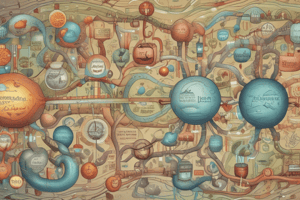Podcast
Questions and Answers
What is the primary function of catabolic pathways?
What is the primary function of catabolic pathways?
- To release energy by breaking down complex molecules (correct)
- To convert energy into chemical forms
- To store energy for future use
- To synthesize complex molecules from simple ones
In which process is carbon dioxide and water converted into glucose and oxygen using light energy?
In which process is carbon dioxide and water converted into glucose and oxygen using light energy?
- Photosynthesis (correct)
- Cellular respiration
- Respiratory metabolism
- Fermentation
Which statement describes kinetic energy?
Which statement describes kinetic energy?
- Energy stored due to an object’s position
- Energy that can be converted to potential energy
- Energy that is in motion (correct)
- Energy that results from chemical bonds
What does the First Law of Thermodynamics state?
What does the First Law of Thermodynamics state?
Which type of pathways consume energy to build larger molecules?
Which type of pathways consume energy to build larger molecules?
What is a characteristic of closed systems in terms of energy transfer?
What is a characteristic of closed systems in terms of energy transfer?
Which of the following describes potential energy?
Which of the following describes potential energy?
What happens to energy during transformations according to the Second Law of Thermodynamics?
What happens to energy during transformations according to the Second Law of Thermodynamics?
Flashcards are hidden until you start studying
Study Notes
Metabolic Pathways
- A sequence of chemical reactions that occur in a specific order
- Begins with a specific molecule (reactants) and ends with a product
- Example: Cellular Respiration
- C6H12O6 + 6O2 → 6CO2 + 6H2O + Energy
- Glucose (reactant) is broken down into carbon dioxide and water (products) by a series of reactions, releasing energy
Metabolism
- The sum of all chemical reactions that occur in an organism
Catabolic Pathways
- Release energy by breaking down complex molecules into simpler compounds
- Cellular respiration is an example
- Glucose is broken down to release energy
- Some steps can be both anabolic and catabolic
Anabolic Pathways
- Consume energy to build larger, more complex molecules from simpler ones
- Polymerization is an example
- Photosynthesis is an example
- 6CO2 + 6H2O + light → C6H12O6 + 6O2
- Carbon dioxide and water (reactants) are converted into glucose (product) using light energy
Bioenergetics
- The study of how organisms manage their energy resources
Energy
- The capacity to do work, to move matter
- Kinetic energy: energy of motion; all atoms exhibit kinetic energy as all molecules are in motion
- Potential energy: amount of energy stored as a result of position or location; the rearrangement of atoms in molecules may result in the potential energy of the molecule being converted into kinetic energy
Laws of Thermodynamics
- The terms open or closed systems refer to whether or not energy can be transferred between the system and its surroundings (can energy be imported or exported)
- Closed systems - energy can not be transferred between systems and its surroundings
- Open systems - energy can be transferred between systems and its surroundings
- First Law: Energy can only be transformed; it cannot be destroyed or created
- Second Law: Each energy transformation results in less usable energy, increasing entropy (disorder).
Studying That Suits You
Use AI to generate personalized quizzes and flashcards to suit your learning preferences.




